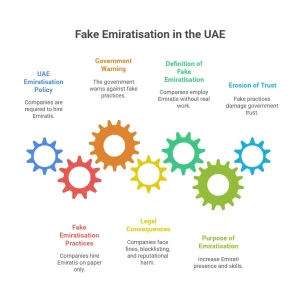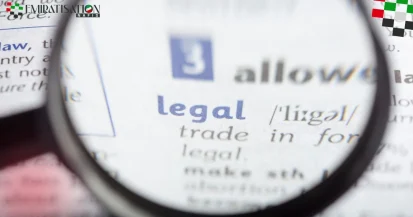The UAE is serious about Emiratisation. Companies are required to hire Emiratis to meet specific quotas. Yet some businesses take shortcuts through fake Emiratisation in UAE companies’ practices, where Emiratis are hired only on paper without real roles. This trend undermines national goals and has triggered stronger laws, fines, and audits.
The government has sent a clear warning: fake Emiratisation in UAE means financial penalties, blacklisting, and reputational harm. Businesses that fail to comply will struggle to survive in the UAE’s competitive market. Understand the legal terms of following Emiratisation in this guide to move ahead with safety and precautionary measures.
What is Fake Emiratisation in UAE?
Fake Emiratisation occurs when companies employ Emiratis without giving them actual work. These hires may receive salaries or benefits, but they do not contribute to operations. In some cases, fake job titles are created just to meet quota requirements.
The practice defeats the purpose of Emiratisation, which is meant to:
- Increase Emirati presence in the private sector
- Build skills and careers for UAE nationals.
- Reduce dependence on expatriate workers.s
- Support the UAE’s long-term workforce strategy.
When companies take this route, they not only break the law but also erode the trust the government has placed in the private sector.

Why Some Companies Engage in Fake Emiratisation in UAE
Businesses turn to false Emiratizations because they find it an easier means of filling orders without using time or resources. Most common reasons are:
- Escaping a phony Emirates fine for non-compliance
- Achieving Emiratisation eligibility for government contracts
- Boosting companies to meet national hiring targets.
- saving money on training, onboarding, and career development expenses for Emiratizations.
Even though the rationale is cost savings, facts are different. Companies end up paying much higher fines and losing business opportunities after being caught. In recent years, many firms discovered that short-term “savings” from counterfeit Emiratizations equated to long-term financial loss.
UAE Government Crackdown on Fake Emiratisation Practices
The UAE takes charge against fake Emiratisation efforts, ensuring companies follow the rules instead of using shortcuts. This move protects the core objective of this initiative while promoting genuine opportunities for Emiratis.
Fake Emiratisation in UAE Law Penalties
Fake Emiratisation UAE law penalties target businesses that attempt to mislead authorities. The punishments include annulment of fake contracts, cancellation of benefits gained through fraud, and continuous monitoring. Companies also lose access to MoHRE support programs that are meant for genuine Emiratisation.
Fake Emiratisation Fines for Companies
| Offense | Fine Amount | Additional Consequences |
| First Offense | AED 100,000 | Emirati hire annulled |
| Second Offense | AED 300,000 | Strict monitoring and audits |
| Third Offense | AED 500,000 | Risk of legal prosecution |
These fines are significant enough to disrupt cash flow. In some sectors, firms have been forced to cut operations after paying multiple penalties.
How Repeat Offenders Are Punished
For repeat offenders, the penalties grow more severe. Companies not only pay higher fines but also face suspension from MOHRE’s digital systems. Blacklisting prevents them from winning government tenders, and in some cases, legal action may follow. Several firms in Abu Dhabi and Dubai have already lost key contracts after repeated violations, proving the government’s zero-tolerance stance.
Consequences of Fake Emiratisation on UAE Companies
Joining fake Emiratisation in UAE not only poses a legal risk, but it also inflicts irreparable damage on a company.
Financial Risks and Huge Penalties
The short-term impact is financial. An Emiratisation fine, which is a fake one, starts at AED 100,000 and increases sharply with frequent contraventions. For companies that already have wafer-thin margins, these fines slice into profits and reduce competitiveness. Those repeatedly non-compliant firms often pay out tens of millions of dirhams in total fines, wiping out years of profits.
In addition to fines, defaulting firms miss incentives. The government offers subsidies and incentives to firms that register actual Emiratisation results. Bogus Emiratisation robs them of such incentives.
Reputational Damage and Blacklisting
Reputation is also paramount in the UAE business community. It is difficult to restore trust once a company has been reported for fake Emiratisation.
- Customers hesitate to sign contracts with blacklisted firms.
- Government partners exclude defaulters from projects.
- Investors view non-compliance as a sign of poor governance.
Several codes have ended up losing their partnerships after being caught faking Emiratisation, and this goes to show that reputation damage is usually more expensive compared to fines.
How to Avoid Fake Emiratisation in Your Company
Preventing fake Emiratisation in UAE requires genuine commitment. Companies that embed Emiratisation in their HR strategy not only stay compliant but also develop their people for the long term.
Compliance with UAE Labour Laws
Being aware of the law is where it begins. Companies must:
- Track quota requirements by company size and industry
- Keep up to date with MOHRE’s quarterly guidelines.
- HR personnel must be trained in compliance and documentation.
- Have open payroll and contract records.
- Authorities closely monitor firms, and documentation ensures audits go smoothly.
Hiring Emiratis the Right Way
Having Emiratis on the staff must be more than merely meeting a number. Companies benefit when Emiratis are utilized properly. Best practices are:
- Giving actual job responsibilities that fit qualifications
- Implementing formal training and mentorship programs
- Safeguarding remuneration and benefits equivalent to the market
- Creating career advancement paths that retain Emirati talent
This approach, in addition to facilitating compliance, also strengthens the business with an enhanced, motivated employee base.
Monitoring and Audits by Authorities
MOHRE has extended its auditing powers. Companies are subjected to payroll audit, surprise visits, and questioning of employees to determine compliance. Several companies have already been fined before this, including the records of Emiratis being remunerated without performing any work.
Having transparent, accurate data ensures that companies can do these inspections risk-free. Consistently performing companies also get better relations with the regulators, which in turn makes future contracts and approvals smoother.
Key Takeaways
- Fake Emiratisation: UAE companies face enormous fines and blacklisting.
- Fake Emiratisation: UAE law fines skyrocket for repeat offenders’
- A fake Emiratisation in UAE, fines not only waste money but also deny government benefits
- Reputational harm tends to be harder to reverse than financial loss.
- Real Emiratisation engenders trust, adherence, and long-term sustainability.
By 2025, companies that fail to achieve real Emiratisation goals will also face additional penalties for every failed recruitment, so it becomes even more expensive to cut corners. The most intelligent path forward is clear: employ Emiratis in good faith, respect the law, and build a labor force attuned to the UAE’s vision of the future.
FAQs on Fake Emiratization and UAE Law
What is the UAE fine for fake Emiratisation?
A fine for fake Emiratisation starts at AED 100,000 for a one-time offense and up to AED 500,000 for repeat offenses.
Can businesses be blacklisted for fake Emiratisation?
Yes. Repeat offenders are blacklisted, suspended from MoHRE platforms, and excluded from government contracts in the future.
How does the UAE monitor Emiratisation compliance?
MoHRE supervises through payroll data, spot inspections, tracking systems, and interviews with Emirati employees to validate job roles.
Is there a difference in penalties for small and large organizations?
The penalty remains the same, but larger organizations are more at risk because they have more quotas to meet. Their scale attracts greater monitoring from the authorities.
Will Emiratisation laws become stricter in 2025 and beyond?
Yes. New laws already have stricter quotas and tougher counterfeit Emiratisation UAE law fines. Regulators are also stepping up audits in an effort to keep companies from taking advantage of loopholes.


